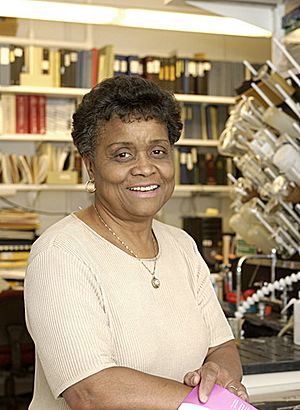Ida Stephens Owens facts for kids
Quick facts for kids
Ida Stephens Owens
|
|
|---|---|

Owens in her laboratory at the NIH
|
|
| Born | September 13, 1939 |
| Died | February 24, 2020 (aged 80) |
| Nationality | American |
| Alma mater | Duke University (Ph.D., 1967) |
| Known for | Drug-detoxifying enzyme metabolism |
| Scientific career | |
| Fields | Physiology Biochemistry |
| Institutions | National Institute of Child Health and Human Development |
| Thesis | Amino Acid Esters as Inhibitors of Growth and of Amino Acyl-tRNA in Synthetases in Astasia Longa and Eugenia Gracilis (1967) |
| Doctoral advisor | Jacob J. Blum |
Ida Stephens Owens (September 13, 1939 – February 24, 2020) was an American scientist. She was famous for her important work with enzymes that help the body get rid of harmful drugs and chemicals.
In 1967, she earned her Ph.D. (a high-level university degree) from Duke University. She was one of the first two African Americans to get a doctorate from that school. Dr. Owens spent most of her career at the National Institutes of Health (NIH) from 1968 to 2017. There, she was a pioneer in studying how human diseases and drug processing are linked to our genes.
Contents
Early Life
Ida Virginia Stephens Owens grew up on a farm in a small town called Whiteville, North Carolina. Her mother passed away when Ida was six years old.
Education and Breaking Barriers
Dr. Owens went to public schools that were segregated, meaning Black and white students were kept separate. She then attended North Carolina College, which is now North Carolina Central University. She graduated in 1961 with top honors in Biology and a minor in Mathematics.
After college, she worked as a lab assistant for a summer. In 1962, she started her Ph.D. studies at Duke University. This was soon after Duke began allowing students of all races into its graduate programs. When she graduated in 1967, she made history. She became one of the first two African Americans, and the first woman, to earn a Ph.D. from Duke University. She was also the first woman to get any degree in physiology from Duke.
A Career in Science
After getting her Ph.D., Dr. Owens began working as a researcher at the NIH. She first worked in a lab focused on biochemistry and metabolism. Later, she moved to the National Institute of Child Health and Human Development (NICHD). During this time, she studied how the body chemically processes different drugs.
In 1975, Dr. Owens started leading her own research team at NIH NICHD. Her team focused on how the body changes drugs. She was the first African American investigator (a scientist who leads their own research) at NIH. From 1988, she directed a special section at NICHD that studied genetic problems related to how drugs are processed.
Amazing Discoveries
Dr. Owens' early research led her to focus on a very important group of enzymes. These enzymes are called UDP-glucuronosyltransferases, or UGTs for short. They are like tiny clean-up crews in your body. They help remove harmful drugs, chemicals, and other toxins.
Dr. Owens developed new ways to study the genes that create these UGT enzymes. She discovered a group of 13 genes known as UGT1A. Her lab showed that one of these genes, UGT1A1, processes a protein called bilirubin. Bilirubin is a waste product from the breakdown of hemoglobin, which is found in your red blood cells.
Her research team made many more discoveries about UGT enzymes.
- They were the first to find a genetic problem in the UGT1A1 gene that causes Crigler–Najjar syndrome. This is a disorder where the body cannot properly get rid of bilirubin, leading to jaundice (yellow skin and eyes).
- Dr. Owens' team also found that UGT enzymes need to be "turned on" before they can detoxify foreign chemicals.
- They discovered that sometimes, slowing down these enzymes can make helpful medicines work even better.
- Her lab also found that other enzymes, called kinases, can change how UGT enzymes work. This helps UGTs detoxify a wide range of different chemicals.
Awards and Recognition
Dr. Owens received several important awards for her work:
- In 1992, she received the NIH Director's Award.
- In 2013, Duke University gave her its first Distinguished Alumni Award.
- In 2009, the American Asthma Foundation recognized her as one of the most frequently cited authors in pharmacology journals. This means her research was very important and often used by other scientists.
 | Janet Taylor Pickett |
 | Synthia Saint James |
 | Howardena Pindell |
 | Faith Ringgold |

